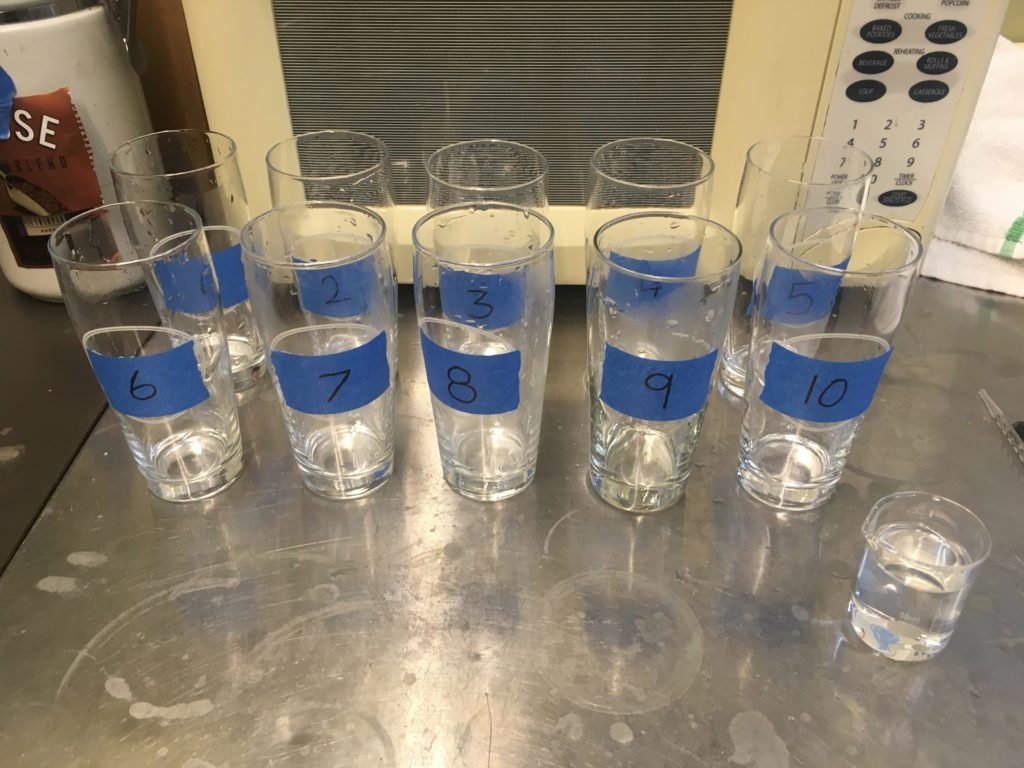Optimization of BioFine Clear
Breweries that don’t have filter their beer, and care about beer clarity will often use some sort of a fining agent to aid in clarification.
Brewers that don’t filter their beer, but still care about beer clarity will often use some sort of fining agent to aid in clarification.
Why optimize? Every yeast strain requires a different dosing rate. If you use too much finings you will get “fluffy bottoms”. Fluffy bottoms decrease yield. If you don’t use enough finings your beer will require more tank time. If you want to get super anal you could optimize for every tank of beer, but this isn’t entirely necessary. It is, however, reasonable to optimize for each style of beer you brew.
A few months back I was getting ready to fine our Pilsner, but could not get my hands on a procedure to optimize the dosing rate of a product called Biofine Clear. Biofine Clear is made by a company called Kerry, which makes a lot of products for breweries. Biofine Clear is made of silicic acid. Silicic acid binds with proteins, which in turn binds with yeast. This causes the haze forming compounds found in beer, to settle to the bottom of the tank. Thus, leaving clear, or brite, beer (if everything works like it is supposed to). The only instruction I got from the manufacturer was, “make up a standard, and dose different amounts into known volumes of beer.” Well, no shit… I was looking for more guidance than that. After racking my brain for a couple of days I was able to recall how this is done.
(Note: I am not a chemist, and have no formal training. In my years as a brewer, I have learned some simple laboratory procedures.)
Biofine Clear is used at a rate of 19-190 mL/BBL, or 40-250 mL/hL of beer.
Equipment:
(1) 100 mL graduated cylinder
(1) 250 mL graduated cylinder
(1) 2 mL pipette
(1) Aspirator bulb for the pipette
(10) ~ 12 oz beer glasses, (250 mL beakers if you have them.)

Procedure:
Using the 2 mL pipette, add 3 mL of Biofine clear to the 100 mL graduated cylinder. Now top up the cylinder to the 75 mL mark with water. (This is a 4/100 dilution. 1 mL of this solution will have 0.04 mL of Biofine Clear in it.) Now, dump the BioFine Clear solution into one of the beer glasses (beakers). Use the pipette as a stir stick, and mix the glass well. Now, using the 250 mL graduated cylinder, fill (10) glasses with 250 mL of the beer you are preparing to fine. (This should be beer which has finished fermentation and has been crashed to your cold conditioning temperature, 30º-35º F.) Using the 2 mL pipette dose the glasses with the prepared solution. Dose, 1, 2, 3, 4, 5, 6, 7, 8, 9, and 10 mLs into the glasses of beer. When finished mix each glass well using the pipette as a stir stick. Cover the glasses with foil and store them in the refrigerator for 24 hours.
Finally, analyze the samples for preferred clarity and the density of the bottoms (trub).
1 mL of solution contains 0.040 of biofine. On a larger scale this translates to 19 mL of BioFine Clear per BBL of beer:
1 mL=19 mL/BBL
2 mL=38 mL/BBL
3 mL= 57mL/BBL
4 mL=76 mL/BBL
5 mL=95 mL/BBL
6 mL=114 mL/BBL
7 mL=133 mL/BBL
8 mL=152 mL/BBL
9 mL=171 mL/BBL
10 mL=190 mL/BBL
Analyze
I want to encourage you to do your job. Run this experiment with your beer, and figure out what works best in your brewery.
